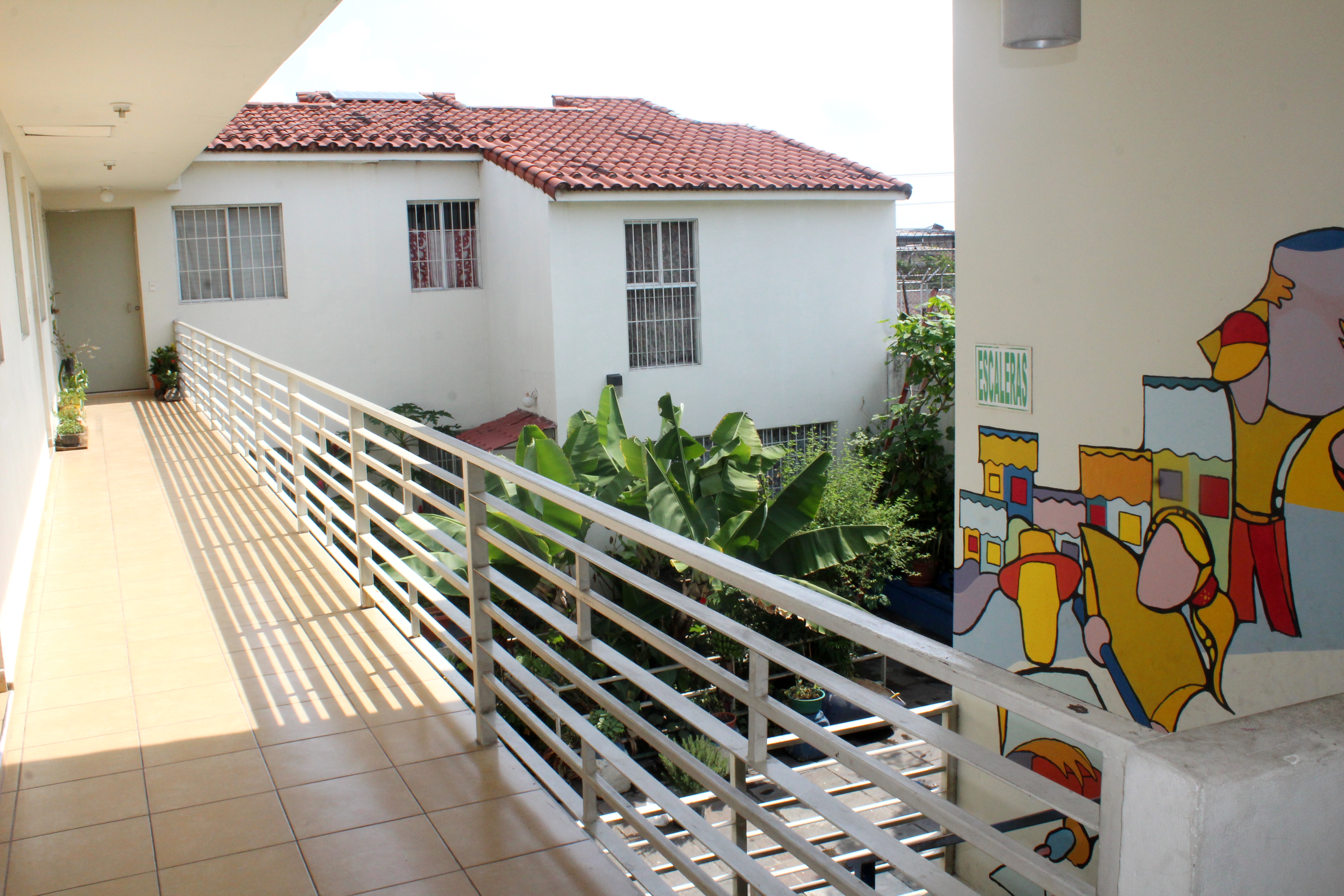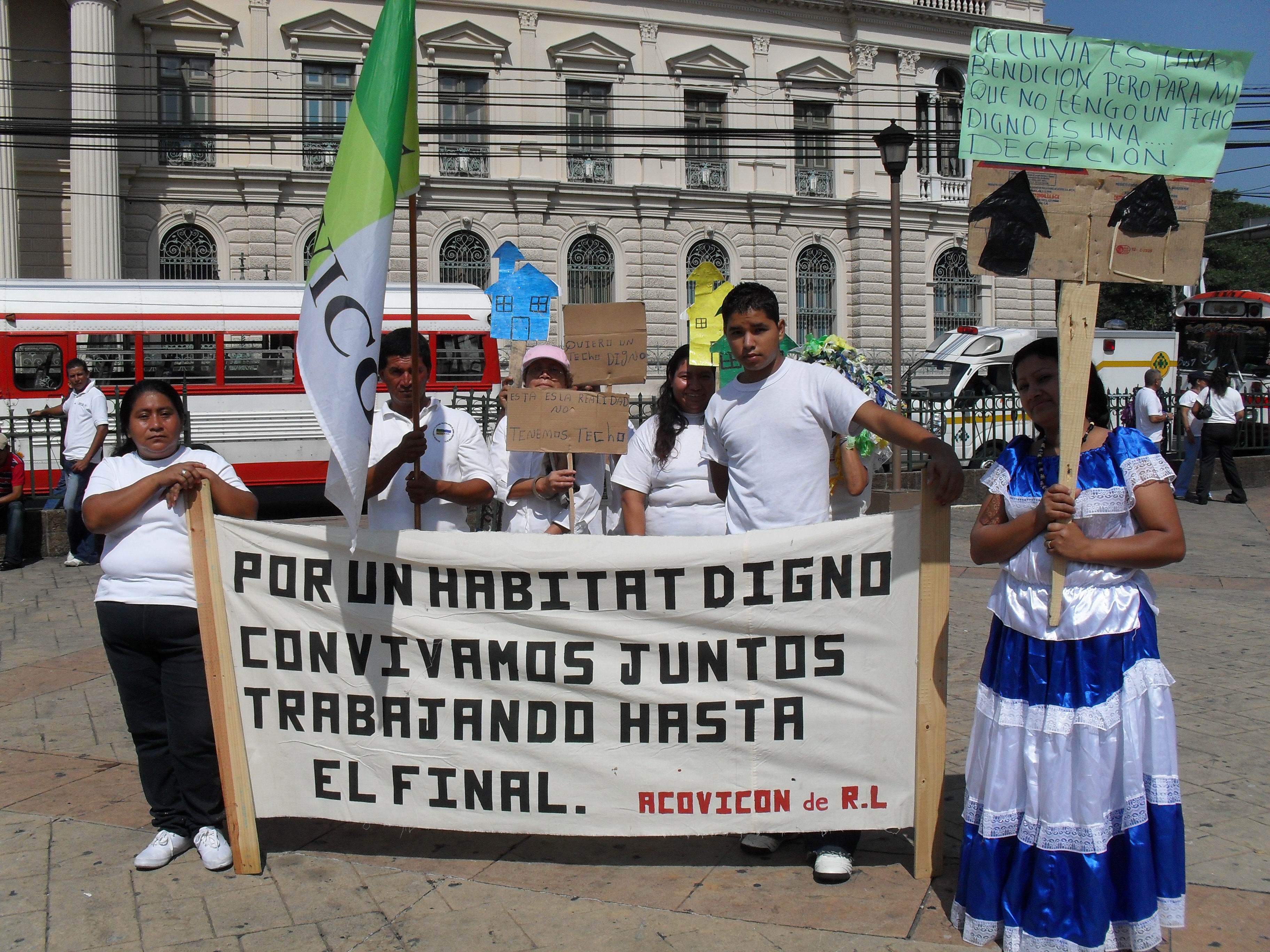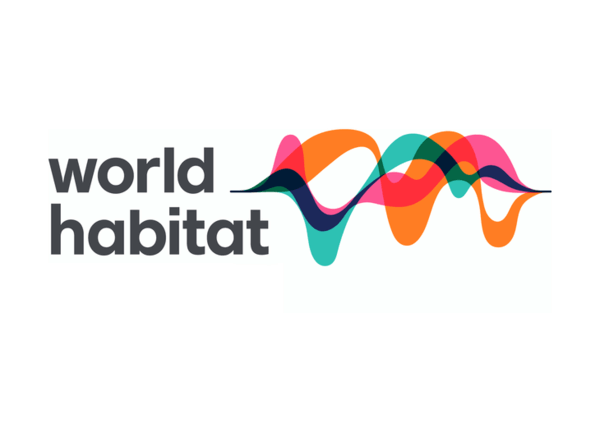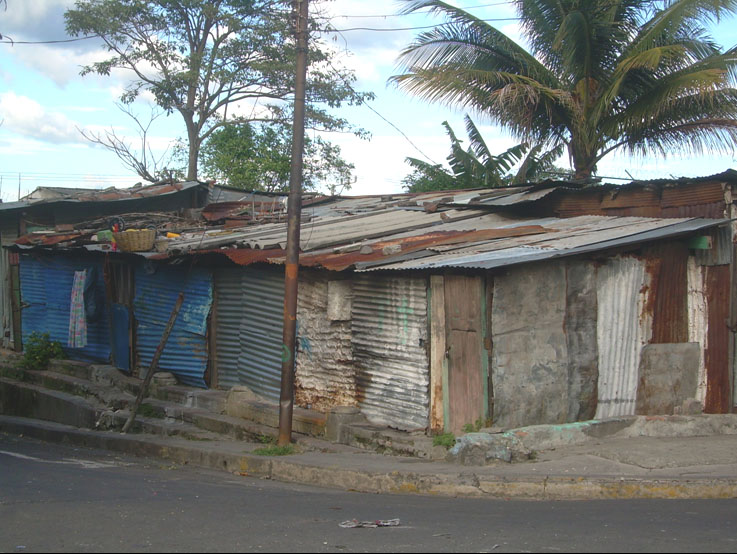 Living conditions before project - © ACOVICHSS
Living conditions before project - © ACOVICHSS- ACOVICHSS residential building - © ACOVICHSS
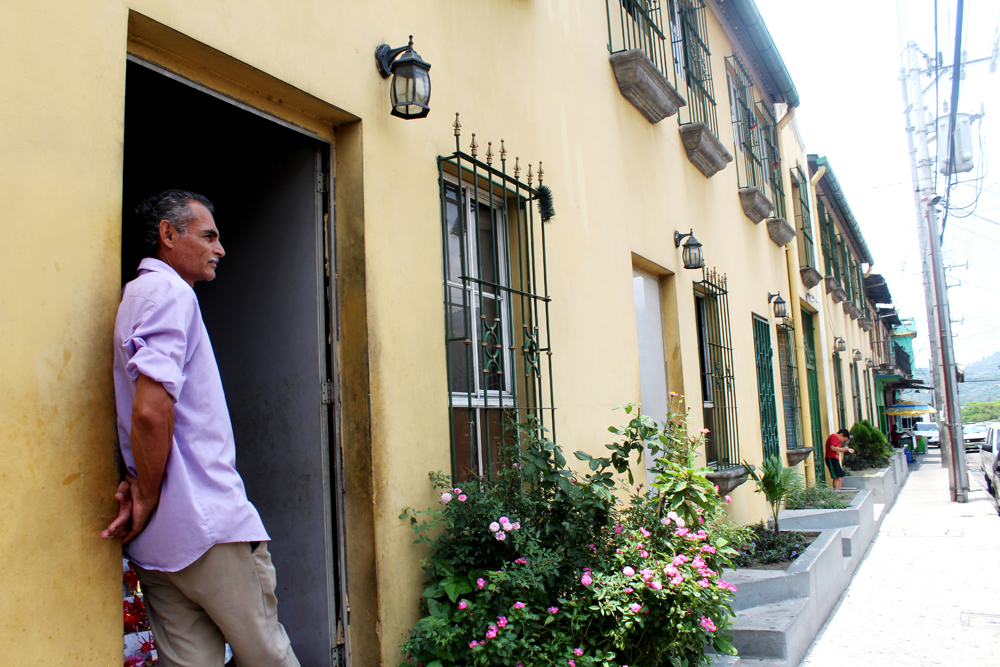 Façade of ACOVIVAMSE cooperative housing - © ACOVIVAMSE
Façade of ACOVIVAMSE cooperative housing - © ACOVIVAMSE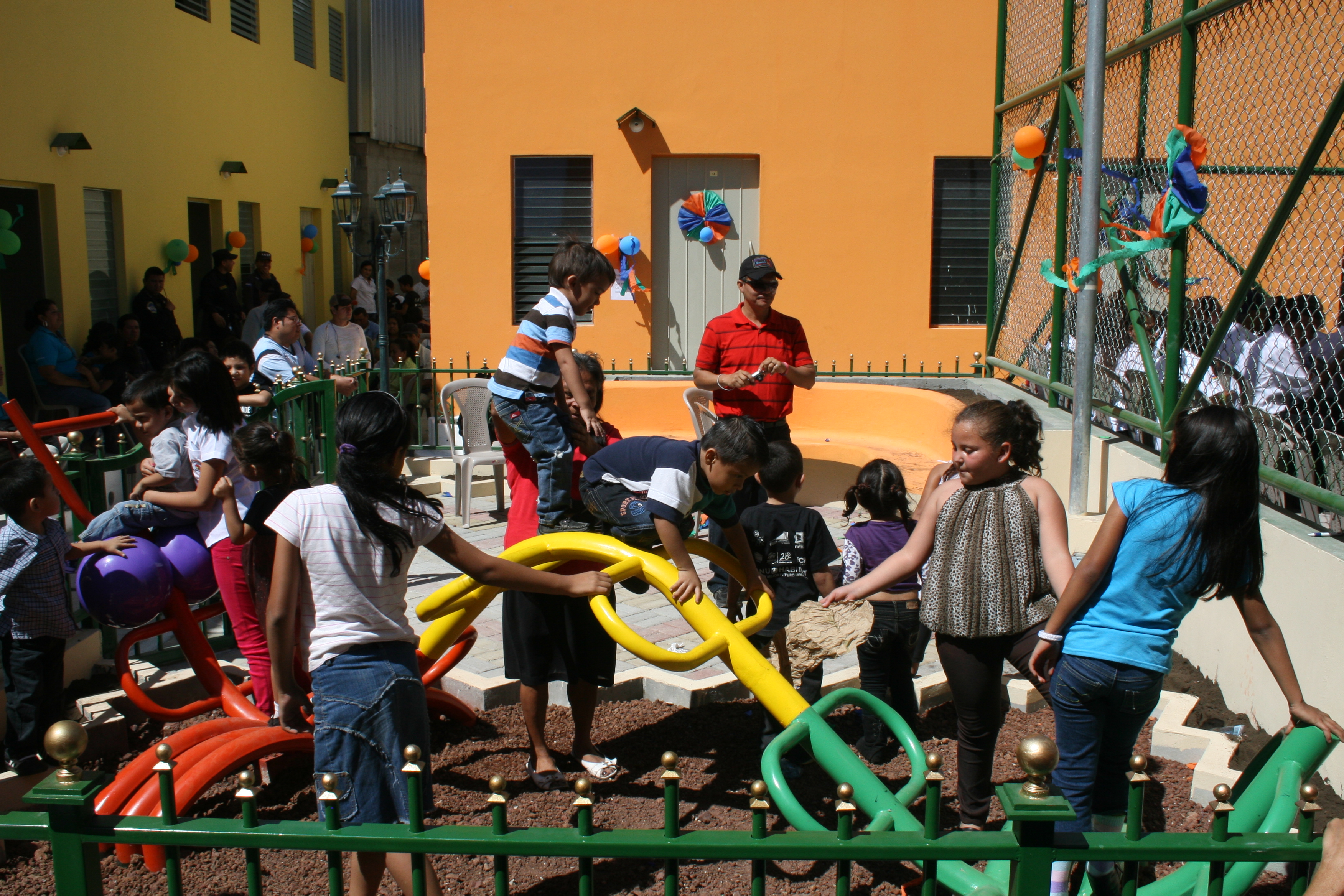 Children’s playground in San Esteban - © ACOVIVAMSE
Children’s playground in San Esteban - © ACOVIVAMSE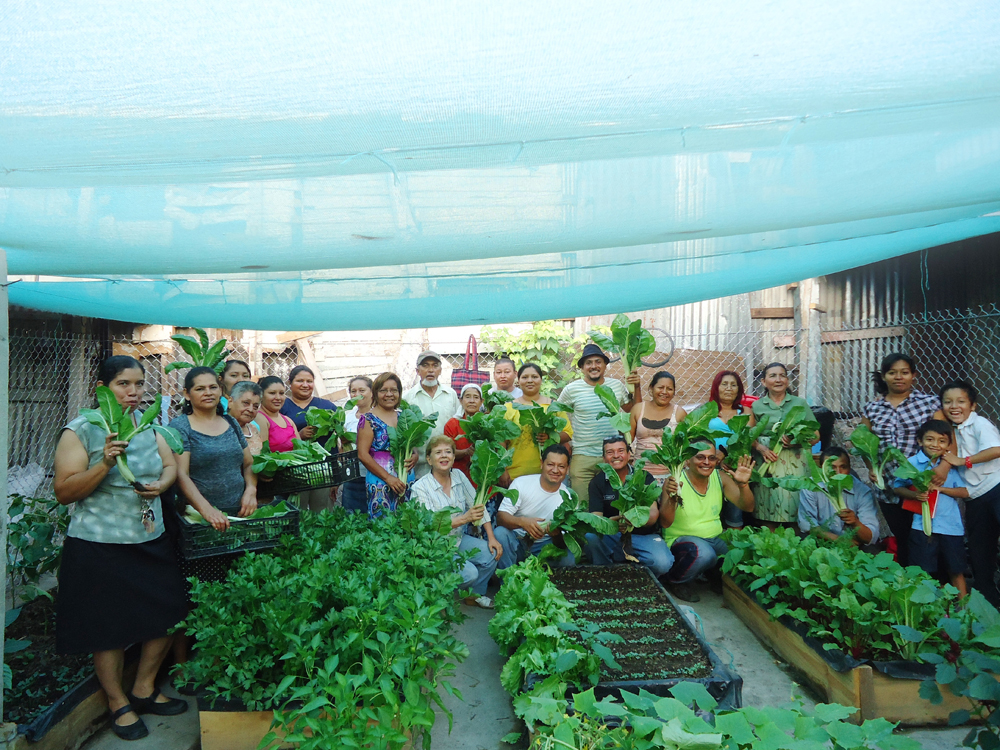 Cooperative’s urban gardens - © FUNDASAL
Cooperative’s urban gardens - © FUNDASAL- Youth cooperative participate in neighbourhood festival - © ACOVICON
City
San Salvador
Main actors
Local Government, National Government, Supranational / Intergovernmental Institutions, NGO / Philanthropy, Community / Citizen Group
Project area
Inner City
Duration
Ongoing since 2008
Supporting families to take ownership of and improve their homes.
Political and social unrest has affected El Salvador for many years. The centre of its capital, San Salvador, is an area of historical and cultural significance but has suffered from violence and dereliction. Many of the households living in the historical centre are among the poorest and most socially excluded in the city. Until recently, they lived in very poor conditions, in unsafe buildings and without proper infrastructure.
Through a programme of training, funding and collaboration, a network of organisations including FUNDASAL (the Salvadorian foundation for development and adequate housing), FESCOVAM (the Salvadorian federation of mutual aid housing cooperatives) and FUCVAM (the Uruguayan federation of mutual aid housing cooperatives) have worked to help the local community to establish 13 mutual aid housing cooperatives in the city’s historic centre. Mutual aid housing cooperatives involve people working together and supporting each other to provide their own homes. Through activism, collaboration and support, poor quality shacks have been replaced with safe, colourful, and permanently affordable homes, owned by the residents themselves.
World Habitat Awards
This project was shortlisted for the 'World Habitat Awards' in 2017 in the following category: Finalist.
Before 2001, the historic centre of San Salvador was in a state of deterioration. Twenty-nine per cent of the centre’s population was living in informal settlements, characterised by a lack of basic services, overcrowding, a risk of eviction and an unhealthy environment due to poor sanitation and waste disposal. Many of the people living in these conditions were vulnerable, with high numbers of women and young people on very low incomes. Eighty-four per cent of the families in the informal settlements were living on less than a quarter of minimum wage (US$55 per month – compared to the minimum wage of US$220). Fifty-seven per cent of the women worked in informal employment.
The regeneration project of San Salvador’s historical centre has provided hope and inspiration, where people work together and support each other to provide their own homes.
Aims and Objectives
The main aims of this work are to support local families to take ownership of and improve their own homes, and to preserve and protect the historic centre of San Salvador. The community along with FUNDASAL, FESCOVAM and other networks are working to:
- protect families from being forced out of the historic centre by helping them legally access land and ensuring their housing costs are affordable.
- improve the homes of families living in poor conditions, ensuring they have access to basic services.
- restore the historic centre of San Salvador for the benefit of the whole community.
- avoid the need for the expansion of informal settlements outside the city centre.
- support the whole community to thrive through a variety of cultural, artistic and educational activities, including people who are often excluded (like women, children, young people, older people or disabled people).
Long term aims include:
- Establishing mutual aid housing cooperatives across El Salvador that can work together to provide their own housing.
- Supporting mutual aid housing cooperatives to influence the Government so they recognise housing as a human right and provide funding and land for housing.
- Ensuring all the residents of the historic centre of San Salvador are properly and safely housed.
In 2008, the Salvadorian Government provided one plot of land to the new cooperatives at a nominal price. Two more plots were bought from private landowners. FUNDASAL raised funds to cover technical training to help the residents design and construct their homes.
Two of the first cooperatives, ACOVICHSS and ACOVIVAMSE, replaced and/or renovated run-down buildings in the inner-city using designs inspired by its historic features. Instead of using new land, existing buildings were replaced and extended upwards. They designed the new buildings to include shared public spaces and provided areas for commercial activities. The cooperatives built colourful multi-storey blocks, designing them around a central courtyard to maximise natural light and ventilation. This comprehensive programme has revitalised the city centre and has created a sense of pride in the community. By 2013, 5 co-operatives were in operation with homes being collectively owned by members of the cooperative. ACOVICHSS and ACOVIVAMSE had built 61 homes in three blocks, housing 240 people. Seventy per cent of these were women-headed households, often living on very low incomes in informal employment.
By 2017, 8 more mutual aid housing cooperatives (13 in total) had formed in the historic centre. The collective effort of the housing cooperatives and the organisations and networks supporting them helped convince the Salvadorian Government to raise €9,000,000 (US$10,043,820), through an agreement with the Government of Italy, to provide new homes for a further 325 families (1,300 people). This is an outstanding achievement as it demonstrates a commitment from the Government to securing adequate and affordable housing for inner-city residents, paving the way for more people to claim their right to land and safe, secure housing.
Thanks to collective ownership and management of housing, all decisions are taken by the members of the housing cooperatives (the people who live or plan to live in the homes). They organise their own committees for designing and building homes, which also creates strong ties between residents as they work together on decision-making. FUNDASAL provides technical advice and helps attract funding for the new housing cooperatives. They carry out training and education programmes and give flexible support to each group. Members of new housing cooperatives share knowledge and encourage others to join their cooperative or create new ones.
The approach of building up instead of out and replacing existing buildings has allowed the community to remain together while protecting the wider area. This has preserved the historic features of the centre of San Salvador, restoring some of its character using designs that complement its original style, and replacing buildings previously damaged by disasters. The new buildings also incorporate bioclimatic features. Basic elements of the bioclimatic design include passive solar systems which are incorporated into buildings and use environmental sources (for example, the sun, wind, vegetation, water etc.) for heating, cooling and lighting the buildings.
Several organisations collaborated alongside the new cooperatives to achieve the rescue of the historic centre:
- FUNDASAL (the Salvadorian foundation for development and adequate housing): Works with communities to organise training, funding and support, to grow the number of mutual aid housing cooperatives across El Salvador
- FUCVAM (Uruguayan federation of mutual aid housing cooperatives): Helped to transfer their approach of setting up mutual aid housing cooperatives to San Salvador (this transfer approach won the World Habitat Awards in 2012).
- FESCOVAM (the Salvadorian federation of mutual aid housing cooperatives): exercise political influence on the Government. This work has helped gain legal recognition, funding and support for mutual aid housing cooperatives from the Government of El Salvador. This means a stronger voice for FESCOVAM (the Salvadorian federation of mutual aid housing cooperatives) and its members in discussions about housing policy.
- San Salvador local government: Sold land to the housing cooperatives at a nominal price.
- FPDICHSS (Permanent Forum for the Integral Development of the Historical Centre of San Salvador): An alliance of different organisations and groups working together to protect the historic centre of San Salvador. The cooperatives of San Salvador have been active in this group since 2005. FUNDASAL became a member in 2007. FUNDASAL was one of the founding members, and the cooperatives started being represented in the Forum by FESCOVAM in 2015.
The residents, supported by FUNDASAL and FESCOVAM, have built a strong, independent community, starting with the most vulnerable and excluded. A range of educational and training activities have built the confidence, health and well-being of the residents of the historic centre of San Salvador. The revolving fund FUNDASAL set up with KfW means repayments from one cooperative can help others in the future.
While initial funding came from external donor organisations, the new government funding represents a shift in their attitude. This funding has been committed from 2018 to 2020, and FUNDASAL and FESCOVAM are in conversation with the Salvadorian government about a new National Law on Housing and Habitat.
The funding for this programme has focused on three areas:
- Research and advocacy
- Training and community building
- Building new homes
FUNDASAL set up a revolving loan fund to support mutual housing cooperatives, so repayments from one project in El Salvador can be used to fund the next. With the support of KfW (a German government-owned development bank), so far one housing cooperative in San Salvador (ACOVIVAMSE, Asociación Cooperativa de Vivienda por Ayuda Mutua San Esteban) has been partially funded in this way. This approach of “recycled funding” will continue to support new projects. The grant and loan funding to ACOVIVAMSE (from the FUNDASAL revolving fund with support from KfW) amounts US$837,901 (2011-2013) for land and construction of housing
The costs of building the new homes are as follows:
- Housing blocks built by the ACOVIVAMSE housing cooperative: US$29,775.
- Housing blocks built by the ACOVICHSS housing cooperative: US$50,797 (these costs are higher than the above since in this case the government did not fund the access to land).
- Housing blocks to be funded by the Government of El Salvador (2018-2020) using funds from the Government of Italy: US$27,692.
Financial sustainability
- The new buildings include homes and a commercial space on the ground floor, so the housing cooperatives can set up businesses such as workshops or commercial spaces to generate income for the local economy.
- The orchards set up in the historic centre will also help to provide affordable food for local families.
- The approach has ensured people living in the housing cooperatives can afford the cost of the new homes by working out maximum housing costs based on member’s capacity to pay.
- Training of housing cooperative members has helped some residents find employment in construction, providing financial stability.
- To guarantee secure housing for community members involved in the project, a funds was set up to cover any shortfalls in housing payments: The Relief Fund use contributions from the cooperative members.
Within this project, an important aim is the protection and preservation of the historic centre of San Salvador. This has been achieved by accommodating families in high quality high-rise blocks which are designed with the local architectural style in mind, rather than building outside the centre of the city. This new housing replaced the poor- quality shacks they had previously occupied and rented. Work to improve the historic centre has extended to shared spaces such as courtyards and playgrounds, an inner-city orchard, and colourful murals and statues which have revitalised the area.
The regeneration of the historic centre of San Salvador has received two prizes for best practice and obtained significant media attention.
- 2008 – National Urbanism Prize (given by the Vice Ministry of Housing and Urban Development) and the International Best Practices Prize (awarded by the Swedish Co-operative Centre – now WeEffect).
- 2010 – Dubai Award for Best Practices awarded to FUNDASAL for the Recovery of the housing complex in the Historical Centre of San Salvador
- 2017 – Finalist in the World Habitat Awards
- Twenty-five articles covering the project in newspapers.
- Several TV and radio interviews.
Environmental impact
The housing cooperatives in the historic centre of San Salvador have replaced existing buildings rather than build new ones outside the centre. This means improved homes can be provided while protecting the wider area from the environmental damage caused by the construction of new buildings. Using land which is already built on also means that existing infrastructure is used. Basic services such as water and sewage systems are more likely to be in place or locally available.
Properties are designed around a central courtyard which means natural light and air can be used for lighting and ventilation and the buildings are more resistant to natural disasters. Because the communities are now well organised, this also improves their ability to respond to natural disasters.
Cooperatives have started growing food within the city centre using organoponic (organic/hydroponic) orchards. This is a form of urban agriculture which can be replicated. It typically uses low concrete walls filled with organic matter and soil, with lines of drip irrigation laid on the surface.
Social impact
This work has improved living conditions for some of the city’s poorest residents, who have secured the right to remain within the historic centre and to stay together as a community. The sense of solidarity created through the whole process of developing the newly formed housing cooperatives means people look after each other. This also extends to financial support. For example, if the parents of children living in the cooperatives die, their housing payments will be covered by the other cooperative members (through the Relief Fund) until they are old enough to take over.
Cooperatives in San Salvador hold ‘solidarity days’ where they come together to contribute to housing construction in their community. In addition, these days also include a shared lunch, which offers a space for socialising participatory discussions on how to transfer the project’s work, methodologies, and the cooperative model. These activities help strengthen the work of each cooperative, along with personal links between members. They are now active members of their communities and networks at local, national and regional levels fighting for safe, secure and adequate housing for all. Being part of a national network has drawn people from cooperatives all over the country to San Salvador to help.
Members of the housing cooperatives have increased confidence and are better able to provide leadership within the community. Seventy per cent are women, many of whom previously had few opportunities. Two schools to train cooperative members (funded by WeEffect) in political engagement and how to run a successful cooperative have been set up to help this continue.
The involvement of the new housing cooperatives in FPDICHSS (the Permanent Forum for the Integral Development of the Historic Centre of San Salvador) has strengthened the ability of the community to work together. They have organised neighbourhood festivals and carried out improvements to public spaces such as parks and squares. Young people have been encouraged to get involved through activities like football tournaments, mural painting and making statues for the area. A new museum for children, “Tin Marin” has been set up by FUNDASAL to provide access to education and culture for the local and surrounding population.
Evaluation
- FUNDASAL evaluates the project by analysing a range of indicators, including:
- Participation and empowerment of women (numbers in management positions; numbers supporting themselves financially, skills acquired).
- Number of successful applications for finance and land.
- Number of people who have received training.
- Number of social activities that help reinforce housing cooperatives.
- Internal evaluations are carried out by the housing cooperatives themselves, in addition to independent external evaluations organised by FUNDASAL.
Evaluation has found that:
- Women have been empowered to participate and increase their leadership skills through the project.
- The work has resulted in safe, secure and affordable housing for inhabitants of the historic centre of San Salvador who were living in poor conditions.
- The project has strengthened the confidence of the housing cooperative members to work together to take control of their own housing.
- Because those involved in the project gained confidence in expressing their views regarding policies, this helped achieve their legal recognition from the Salvadorian Government, helping to secure the housing rights of citizens.
- By working together, the cooperatives won legal recognition, and secured land from the Government to build and manage their own housing.
People living in informal settlements in the historic centre of San Salvador had historically been excluded from decision-making in society. Initially this prevented residents from actively participating in the community and often led to conflict or distrust. However, the first housing cooperative members to build improved housing for themselves (ACOVICHSS) demonstrated what was possible and inspired others to take part.
Financial support from the government for housing was lacking and there was no appropriate legal framework before 2008. This was overcome by collaborating with FESCOVAM (the Salvadorian federation of mutual housing cooperatives) to convince the Government to make the changes needed and provide land and funding. Reinventing the historic centre has also helped to create interest in the project and has increased support for changes in public policies. However, further expansion of this model will be limited if government support is discontinued in the future or if the ability of people to help themselves is underestimated.
The first parcels of land selected by the housing cooperatives for the new phase of the project (to be funded by the Salvadorian Government) did not meet the requirements for development. This was overcome by identifying alternative land so that building could go ahead.
Lessons Learned
- Building upwards and not outwards helps slow down the expansion of urban areas and works as a way of effectively regenerating historic centres.
- The work of FUCVAM (the Uruguayan Federation of Mutual Aid Housing Cooperatives) to train new mutual aid housing cooperatives in El Salvador shows the approach can be adapted to local contexts, where challenges might differ but keeping the mutual aid model and lobbying the government for adequate legislation and funding remains relevant.
- Encouraging different people and organisations to work together is an effective way of making a difference to people’s living conditions.
Transferability
The project has inspired others, and FUNDASAL are sharing their experience to help transfer the approach. This is happening in other historic centres in El Salvador, including Suchitoto in Cuscatlán, and Zacatecoluca in La Paz – where a flexible financial model is currently being set up. The local government in Los Nonualcos is working to promote housing rights and has produced a plan to regenerate its own historic centres. The two training centres (focusing on political engagement and cooperative development) set up through the project will strengthen the knowledge and capacity of housing cooperatives in the region.
Involvement of the housing cooperatives from El Salvador with COCEAVIS (a network for mutual aid housing cooperatives in Central America) is helping to share and transfer knowledge and practice regarding different mutual housing models, including a tool for revitalization of historic centres. And through this network, FUNDASAL has helped provide technical assistance when setting up 65 new mutual aid housing cooperatives across Central America; in Nicaragua, Guatemala, Honduras, Costa Rica and Mexico and has included lessons from this project. They are also exchanging experiences with organisations working to regenerate Hebron, Palestine.
The regeneration of the historic centre of San Salvador has influenced the Salvadorian Government to continue to support and invest in new mutual aid housing cooperatives. This is set out in official policy documents, including their five-year development plan for 2014 – 2019.
External links / documents
On Map
The Map will be displayed after accepting cookie policy
